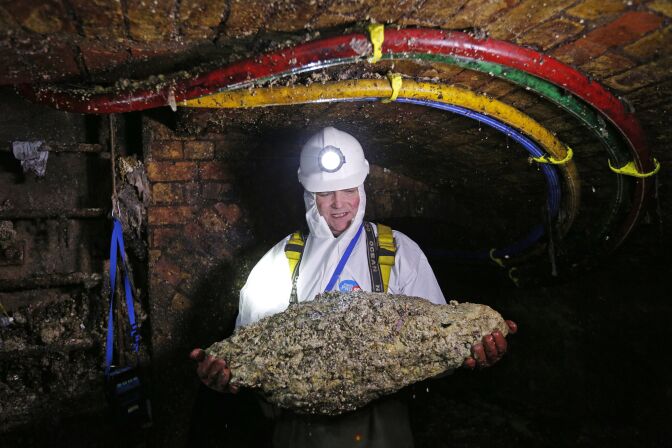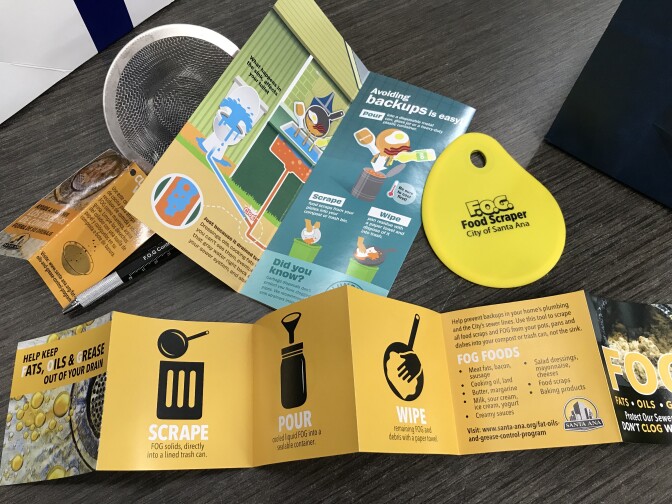This story is free to read because readers choose to support LAist. If you find value in independent local reporting, make a donation to power our newsroom today.
The holidays are fatberg season. What they are and why you should care

Holiday meals, with all that butter, cream and gravy, can leave you feeling stuck to the couch. All that grease and oil can wreak havoc on our sewer systems, too, when they combine with trash to form something called a fatberg.
"Our drains work overtime during the holidays, because many people are spending more time at home doing a lot of cooking," said Robert Hernandez, water quality supervisor with the City of Santa Ana.
When fat, oil and grease — collectively known as "FOG" in the wastewater world — accumulate in sewer lines, they can cause sewage spills and the need for costly repairs.
And they can create what are known as fatbergs. And yes, it is as gross as it sounds.
What is a fatberg?
"It's like an iceberg, but made of fat," said Mark Kawamoto, environmental protection manager at the Orange County Sanitation District.
Fatbergs are an agglomeration of all the grease and oily things we're not supposed to pour down the drains, but do anyway, sometimes combined with other things we're not supposed to flush, like wet wipes.
Think bacon grease, the leftover drippings in the pan you cook your turkey in, even salad dressings and cream. When you pour them down the drain they can glom together, and can create slowdowns or blockages in our sewer systems.

Fatbergs don't float like icebergs, but they can get huge. Wastewater workers in the city of London famously found a fatberg in 2017 that measured 250 meters long and weighed an estimated 130 tons.
Kawamoto said he's never come across a fatberg in the wild. But Hernandez has, some 15 years ago, in a pump station in Santa Ana. "I remember seeing it and going, 'whoa, that is humongous.'"
Hernandez estimates it was about 30-feet high and 20-feet wide. "We had the vacuum truck come and suck it up and dispose of it," he said.
Giant fatbergs in Orange County, and elsewhere in California, are uncommon these days. Restaurants have to follow strict requirements for disposing of used oil and grease. And cities and sanitation districts have worked to educate residents about what they should and shouldn't put down the drain.
Why wastewater workers wish for a fatberg-free holiday

Jessica Leigh Hester wrote a whole chapter on fatbergs — part of her new book, "Sewer." She said non-biodegradable wipes, which became especially popular during the pandemic, often serve as the foundations of fatbergs.
"One way that someone described it to me was that gloopiness begets more gloopiness," Hester said. "So once you have this sticky surface, more things are likely to glom onto it."
The bigger and gnarlier these accumulations get, the more likely they are to clog up sewer pipes, leading to backups and dangerous gases. Hester said fatbergs are the number one problem she heard from sewer workers across the U.S. — and around the globe — while researching her book.
Our sewers were simply not built to carry away fat and grease and trash, Hester said.
"They are, I guess, like many humans stretched too thin, overtaxed, doing way more than they thought they would be enlisted to do when they signed up for the job," she said.
The National Association of Clean Water Agencies, which represents public waste and stormwater services, estimates that wipes in the pipes cost these agencies about $441 million a year. They also make it harder to recycle wastewater, said Kawamoto.
"So it's becoming more and more critical that people need to be cautious about what they actually send down the sewer," he said.
California and several other states have passed legislation in recent years requiring wipes with plastic fibers to carry a "Do not flush" label. And there's similar legislation in Congress.
How to safely dispose of food waste
Here are some tips for a fatberg-free holiday:
- Use a glass jar to store hot turkey or bacon grease until it cools down and can be safely thrown in the trash. You can also mix it with coffee grains or shredded newspaper to keep it from gunking up garbage trucks.
- Even salad dressing and fatty things like butter and sour cream should go in the trash, not down the drain.
- Use a food scraper to scrape leftovers into the trash or compost — not the garbage disposal.
- If you're going out of town or are otherwise worried that your trash is going to sit out too long and stink, you can store food waste in a container in the freezer until trash day.
Can't get enough of fatbergs? Here's a comic book about them. Plus, more tips from O.C. Sanitation District on how to avoid them.
Updated December 21, 2022 at 2:24 PM PST
This story was updated with additional information about wastewater workers feelings about fatbergs.








